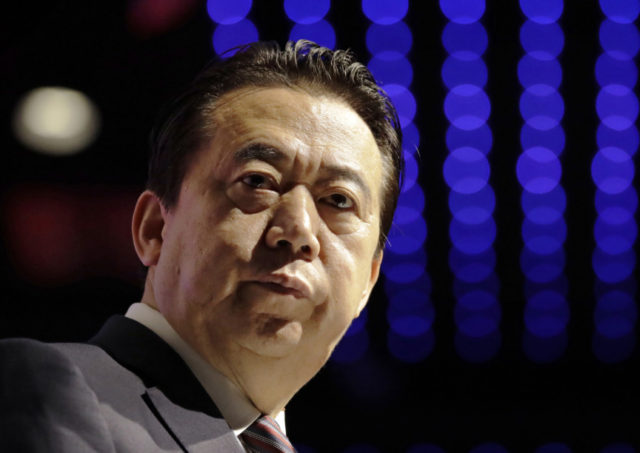The secretary general of Interpol, Juergen Stock, discussed the disappearance of former agency president Meng Hongwei in depth on Thursday, insisting that the Chinese government’s arrest of him was a “sovereign” matter in which Interpol could not challenge or intervene.
Meng, the first Chinese national to rise to the title of president of the organization, disappeared in early October after leaving France, where the Interpol’s offices are located, to visit family in China. In response to the international uproar over his vanishing, the Chinese government abruptly announced that month that they had arrested him upon arriving in China on unspecified corruption charges and notified Interpol that Meng had allegedly chosen to resign from the presidency.
At the time of his arrest, Meng also held the title of vice chairman of China’s Ministry of Public Security (MPS) and had worked for over two decades in Chinese law enforcement.
The Chinese communist regime has not provided any evidence that Meng is alive and safe since their announcement of his arrest.
On Thursday, Stock addressed reporters, noting that he is the operational head of the organization, while “president” is a broader title that does not disrupt the day-to-day work of the organization. He went on to insist that Interpol’s rules strictly prevent it from engaging in behavior that could be interpreted as violating the sovereignty of member nations, meaning the agency would not be investigating Meng’s disappearance.
“We have to accept, like we would accept with any other country, that this country (China) is taking sovereign decisions and if that country tells us: ‘we have investigations, they are ongoing, and the president has been resigning, he’s not a delegate of the country anymore,’ then we have to accept,” Stock told reporters.
He went on to add that Interpol is “not an investigative body” and that, upon receiving news from the Chinese government that Meng had resigned, “there was no reason for me to [suspect] that anything was forced or wrong.” He did not confirm that Interpol heard from Meng personally, rather suggesting that the Chinese government relayed a message allegedly from Meng to Interpol.
The French newspaper Le Monde reported this week that its journalists had seen a copy of documents from the Chinese government, including the alleged resignation letter. The short letter reportedly only read, “As I am suspected of breaking the law, I voluntarily resign from my position as President of Interpol.”
Stock concluded that Interpol was “strongly encouraging China” to be transparent in the investigation against Meng and that he hoped Beijing would provide more information on the alleged investigation against him “when the right moment comes.”
While he did not speak at this week’s conference, acting Interpol President Kim Jong Yang had issued much sterner statements in the aftermath of Meng’s “resignation.”
“I find it regrettable that the top leader of the organisation had to go out this way and that we weren’t specifically notified of what was happening in advance,” Kim said at the time. “We still don’t have sufficient information about what’s happening [with Meng] or whether it has anything to do with Chinese domestic politics.”
Beijing has largely abstained from discussing the Meng case since October. During that month, the Ministry of Public Security announced that Meng was wanted for bribery “and other violations” and proclaimed that his arrest was a “wise and absolutely correct” decision.
“The Party committee of the MPS agrees that investigation of Meng is the result of his own bigoted course. The committee firmly supports the supervisory investigation of Meng,” the ministry said in a statement. Chinese state media speculated that Meng had “jeopardized national security” without elaborating.
The Chinese Global Times newspaper also responded to critics in the West who demanded proof that Meng was alive and safe.
“The Western media’s brouhaha stems from their disrespect for Chinese law and misunderstanding of China’s anti-corruption campaign,” the Times asserted. “Wherever China’s legal system differs from the West’s, they arrogantly regard such differences as ‘flaws.'”
Meng’s wife Grace, who remains in France, said in several interviews that she believed her husband’s life was in danger. She revealed that the last messages she received from Meng were a text reading “wait for my call” followed by a knife emoji, which she interpreted as meaning that he was in danger.
Prior to Meng’s disappearance, the Chinese government had condemned Interpol for dismissing requests for “red alerts,” which urge countries to extradite wanted criminals, for human rights advocates affiliated with the country’s ethnic Uighur minority. Early this year, Interpol angered Beijing by dropping a red alert for Dolkun Isa, the head of the World Uyghur Congress, an advocacy group for the minority. That decision preceded mounting reports that China has established labor and concentration camps for Uighurs in western Xinjiang province, where they are forced to learn Mandarin and memorize communist propaganda songs or face torture and the punishment of their families.

COMMENTS
Please let us know if you're having issues with commenting.